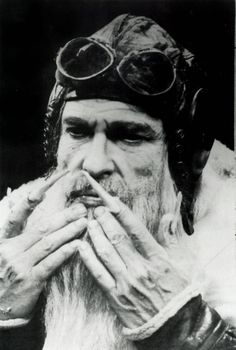Regardless of what actually killed him, Howard Hughes died of being Howard Hughes, eaten alive from the inside by neuroses. But that doesn’t mean he was alone at the feast. An autopsy suggested codeine and painkillers were among the culprits, and his personal physician, Dr. Wilbur Thain, whose brother-in-law Bill Gay was one of the executives angling for control of Hughes’ holdings, was treated like a precursor to Conrad Murray, though he was ultimately cleared of any wrongdoing.
From Dennis Breo’s 1979 People interview with Thain, who made the extremely dubious assertion that aspirin abuse claimed the man who was both disproportionately rich and poor:
Question:
Are you satisfied that Hughes received adequate medical attention?
Dr. Wilbur Thain:
Everything possible was done to help Hughes in his final hours. At no time did the authors of Empire try to get in touch with me. Yet they say in the book that an aviator friend of Hughes called me in Logan, Utah two days before Hughes’ death and told me, “I don’t want to play doctor, but your patient is dying.” I am quoted as telling the guy to mind his own business, since I had to go to a party in the Bahamas. Well, the first word I actually got that Hughes was in trouble was about 9 p.m. April 4, 1976—the night before he died. I was in Miami at the time—not Utah. At about midnight I was called and told that Hughes had suddenly become very critical. I was stunned. I left Miami at 3:30 a.m., arriving in Acapulco at 8 a.m. April 5.
Question:
What was the first thing you did?
Dr. Wilbur Thain:
Empire says the first thing I did was spend two hours shredding documents in Hughes’ rooftop suite at the Acapulco Princess. This is absolutely false. I walked straight into Hughes’ bedroom with my medical bag. He was unconscious and having multiple seizures. He looked like he was about to die. Other than one trip to the bathroom, I spent the next four hours with him.
Question:
Why did you then fly to Houston?
Dr. Wilbur Thain:
The Mexican physician who had seen Hughes advised against trying to take him to a local medical center, so we spent two hours trying to find an oxygen tank that didn’t leak and preparing the aircraft to fly us to Houston. We left at noon. He died en route.
Question:
Was Howard Hughes psychotic?
Dr. Wilbur Thain:
No, not at any time in his life. He was severely neurotic, yes. To be psychotic means to be out of touch with reality. Howard Hughes may have had some fanciful ideas, but he was not out of touch with reality. He was rational until the day he died.
Question:
Was Hughes an impossible patient?
Dr. Wilbur Thain:
That’s a masterpiece of understatement. He wanted doctors around, but he didn’t want to see them unless he had to. He would allow no X-rays—I never saw an X-ray of Hughes until after he died—no blood tests, no physical exams. He understood his situation and chose to live the way he lived. Rather than listen to a doctor, he would fall asleep or say he couldn’t hear.
Question:
Is that why you didn’t accept his job offer after you got out of medical school?
Dr. Wilbur Thain:
No, I just wanted to practice medicine on my own. I understand that Hughes was quite upset. I didn’t see him again for 21 years. He was 67 then. He had grown a beard, his hair was longer. He had some hearing loss partially due to his work around aircraft. That’s why he liked to use the telephone: It had an amplifier. He was very alert and well-informed. His toenails and fingernails were pretty long, but he had a case of onchyomycosis—a fungus disease of the nails which makes them thick and very sensitive. It hurt like hell to trim them. For whatever reason, he only sponge-bathed his body and hair.
Question:
What was the turning point?
Dr. Wilbur Thain:
After his successful hip surgery in August of 1973 he chose never to walk again. Once—only once—he walked from the bedroom to the bathroom with help. That was the beginning of the end for him. I told him we’d even get him a cute little physical therapist. He said, “No, Wilbur, I’m too old for that.”
Question:
Why did he decide not to walk?
Dr. Wilbur Thain:
I never had the chance to pry off the top of his head to see what motivated decisions like this. He would never get his teeth fixed, either. Worst damn mouth I ever saw. When they operated on his hip, the surgeons were afraid his teeth were so loose that one would fall into his lung and kill him!
Question:
What kinds of things did he talk about toward the end of his life?
Dr. Wilbur Thain:
The last year we would talk about the Hughes Institute medical projects and his earlier life. All the reporting on Hughes portrayed him as a robot. This man had real feelings. He talked one day about his parents, whom he loved very much, and his movies and his girls. He said he finally gave up stashing women around Hollywood because he got tired of having to talk to them. In our last conversation, he told me how much he still loved his ex-wife Jean Peters. But he was also always talking about things 10 years down the road. He was an optimist in that sense. If it hadn’t been for the kidney failure, Hughes might have lasted a lot longer.•
A 1976 Houston local news report on the death of Howard Hughes, whose demise was as shrouded in mystery as was much of his life.
Tags: Dennis Breo, Howard Hughes, Wilbur Thain

